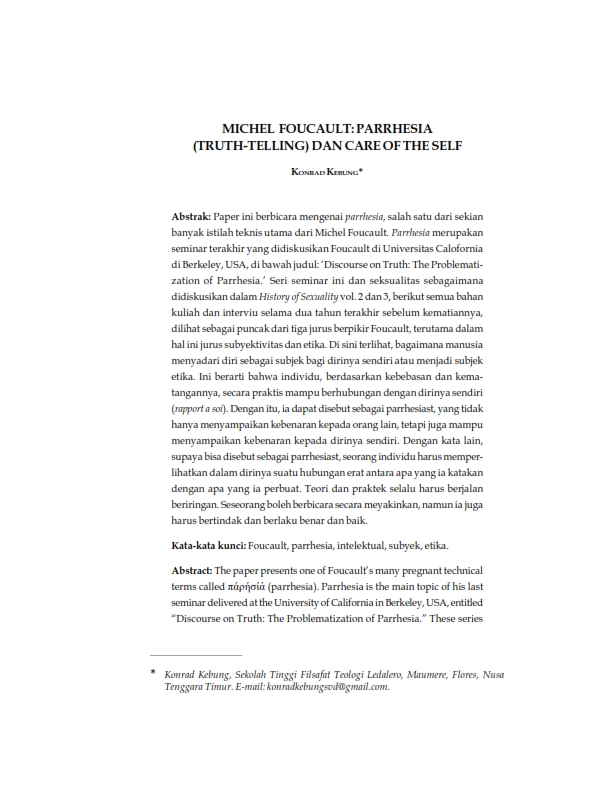Michel Foucault: Parrhesia (Truth-Telling) Dan Care Of The Self
Abstract
Abstrak: Paper ini berbicara mengenai parrhesia, salah satu dari sekian banyak istilah teknis utama dari Michel Foucault. Parrhesia merupakan seminar terakhir yang didiskusikan Foucault di Universitas Calofornia di Berkeley, USA, di bawah judul: ‘Discourse on Truth: The Problemati- zation of Parrhesia.’ Seri seminar ini dan seksualitas sebagaimana didiskusikan dalam History of Sexuality vol. 2 dan 3, berikut semua bahan kuliah dan interviu selama dua tahun terakhir sebelum kematiannya, dilihat sebagai puncak dari tiga jurus berpikir Foucault, terutama dalam hal ini jurus subyektivitas dan etika. Di sini terlihat, bagaimana manusia menyadari diri sebagai subjek bagi dirinya sendiri atau menjadi subjek etika. Ini berarti bahwa individu, berdasarkan kebebasan dan kema- tangannya, secara praktis mampu berhubungan dengan dirinya sendiri (rapport a soi). Dengan itu, ia dapat disebut sebagai parrhesiast, yang tidak hanya menyampaikan kebenaran kepada orang lain, tetapi juga mampu menyampaikan kebenaran kepada dirinya sendiri. Dengan kata lain, supaya bisa disebut sebagai parrhesiast, seorang individu harus memper- lihatkan dalam dirinya suatu hubungan erat antara apa yang ia katakan dengan apa yang ia perbuat. Teori dan praktek selalu harus berjalan beriringan. Seseorang boleh berbicara secara meyakinkan, namun ia juga harus bertindak dan berlaku benar dan baik.
Kata-kata kunci: Foucault, parrhesia, intelektual, subyek, etika.
Abstract: The paper presents one of Foucault’s many pregnant technical terms called πάρήσίά (parrhesia). Parrhesia is the main topic of his last seminar delivered at the University of California in Berkeley, USA, entitled “Discourse on Truth: The Problematization of Parrhesia.” These series of seminar and the issue of sexuality as discussed in his History of Sexuality vol. 2 and 3, added with all his lectures and interviews during the last two years before his death, are seen as the peak of his three axes of thought, namely the axis of subjectivity and ethics. There, we see how humanbeing is aware of him/her self as subject of him/her own self or of being the subject of ethics. This means that the invididual, based on his freedom and maturity, is practically able to relate with him/her self (rapport a soi). He is then to be called the parrhesiast, who not only tells the truth to other people, but also be able to tell the truth to him/her self. In other words, in order to be a parrhesiast, an individual should show in his/her life a correspondence between what he/she speaks and what he/she does. Theory and practice should go hand in hand. One can speak convincingly, yet is also to behave well.
Keywords: Foucault, parrhesia, intellectual, subject, ethics.

DISKURSUS applies the Creative Commons license (CC BY). We allow readers to read, download, copy, distribute, print, search, or link to the full texts of its articles and allow readers to use them for any other lawful purpose. The author must be aware that the article copyrights will be fully transferred to DISKURSUS if the article is accepted to be published in the journal. Once the manuscript has been published, authors are allowed to use their published article under DISKURSUS copyrights. Full information about CC BY can be found here: https://creativecommons.org/licenses/by/4.0/












